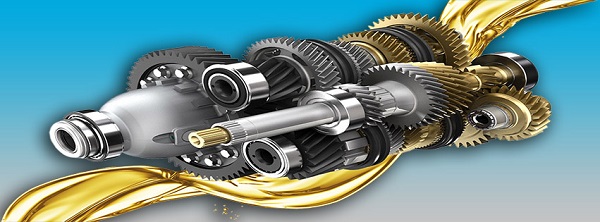Oil additives are chemical compounds that improve the lubricant performance of base oil. Manufacturer of many different oils can utilize the same base oil for each formulation and can choose different additives for each specific application. Nearly all commercial motor oils contain additives, whether the oils are synthetic or petroleum based, additives comprise up to 5% by weight of some oils.
Oil additives are vital for the proper lubrication and prolonged use of motor oil in modern internal combustion engines. Without many of these, the oil would become contaminated, break down, leak out, or not properly protect engine parts at all operating temperatures. Some of the most important additives include those used for viscosity and lubricity, contaminant control, for the control of chemical breakdown, and for seal conditioning. Some additives permit lubricants to perform better under severe conditions, such as extreme pressures and temperatures and high levels of contamination.
Role of additives in motor oil
Andrew Dziuba of UAB SCT LUBRICANTS says that, “The main role of additives is to reduce engine wear and increase fuel efficiency.”
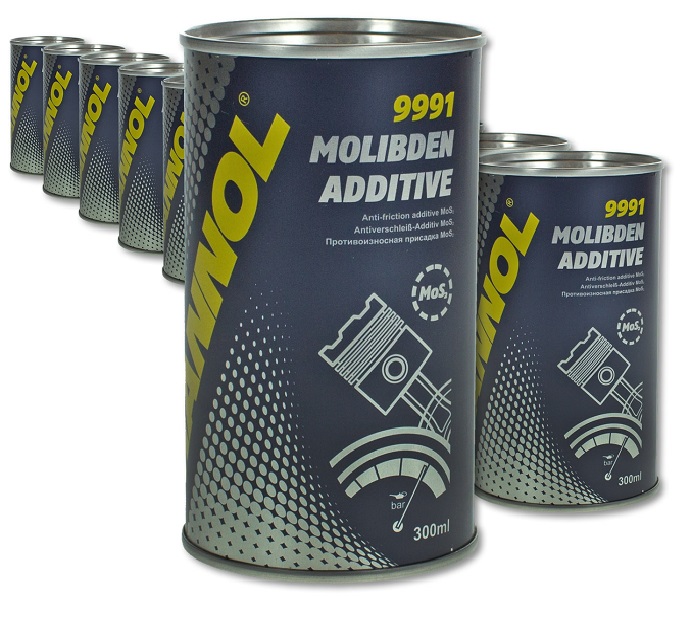
UAB SCT Lubricants is a leading manufacturer of high-quality engine oils and automotive fluids located in Klaipeda, Lithuania.
“An additive is a chemical added in small quantities to a product to improve certain properties. Motor oil typically contains a Performance Additive Package that can make up 5% to 15% of its composition. The remaining percentage is base oil. The additives help to enhance the performance and viscosity of the motor oil,” says Erik Vermeer, Commercial Director at RYMAX LUBRICATS.
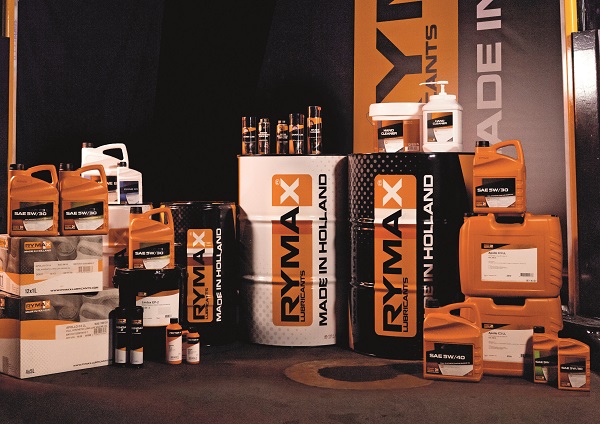
Rymax is an international lubricants brand from the Netherlands. The company specialize in automotive and industrial lubricants.
According to DANA LUBRICANTS FACTORY LLC, one of the leading manufacturers of lubricants in UAE, additives help lubricants withstand extreme operating environments. Even the best base oil cannot protect as well against the effects of heat, shearing forces, chemical and water dilution, corrosion and wear particles. In short, additives make good base oils better. They give good base oils the performance benefits consumers expect, such as multi intervals and extreme-pressure performance.
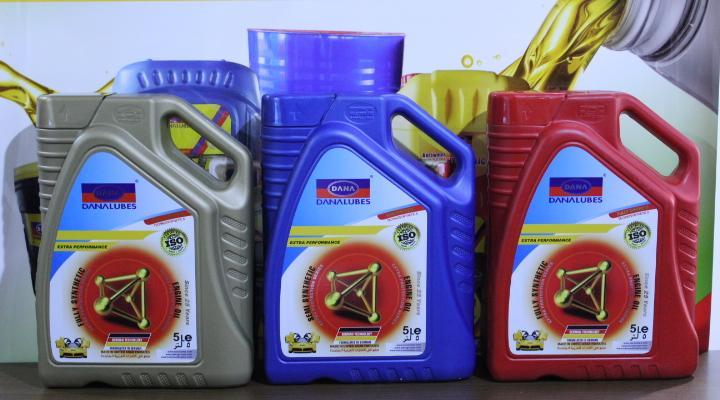
“Additives help lubricants withstand extreme operating environments. Even the best base
oil cannot protect as well against the effects of heat, shearing forces, chemical and water dilution, corrosion and wear particles. In short, additives make good base oils better. They give good base oils the performance benefits consumers expect, such as multi-grade performance, extended drain intervals and extreme-pressure performance,” says DANA Lubricants.
Oliver Kuhn, Deputy Head of the Oil Laboratory at LIQUI MOLY GmbH, says, “Additives deliver the performance of the motor oil. Motor oil consists of two main components: base oil (the actual oil) and the additive composition. In the latest motor oils, the role of the base oil is more or less reduced to a carrier fluid for the additives. Even lubrication is provided rather by the additives than by the base oil.” Liqui Moly GmbH is a German company specializing in oils, lubricants and additives.
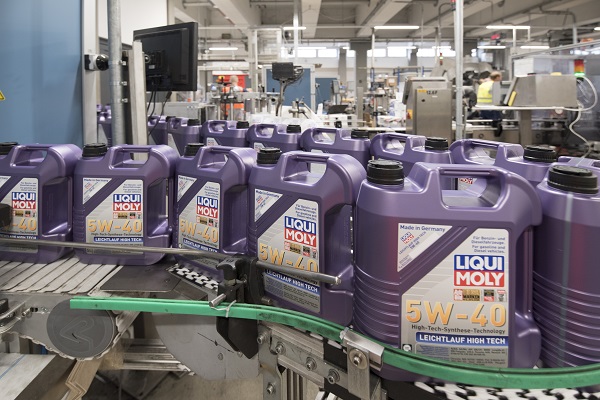
“In former times, lubrication has been the main job of an engine oil. Today, there are lot of additional tasks an engine oil is required to do: it needs to keep the oil system clean by removing contaminants and transporting them to the oil filter. It needs to protect the oil system from corrosion by neutralizing acids which may form in the oil. It needs to keep the viscosity stable over a wide temperature range. It needs to suppress foaming. It needs to remain liquid enough at low temperatures to quickly reach and lubricate moving parts after the engine is started. And it needs to be capable of overcoming even very high engine temperatures. It is the additive packages which take care of all these tasks. If you use motor oil without additives, i.e. just base oil, in a modern car, the engine would survive this only for a few kilometers,” adds Kuhn.
Dmitry Tsyplyaev, Executive Director – Suprotec EU s.r.o. (ATOMIUM Brand) says, automotive additives and lubricants aim to protect car motor, to restore friction knots, to prolong the lifecycle of internal combustion engines, mechanisms, gear boxes.
Atomium tribo-technology is unique, because the base of our Atomium products – is mineral (natural product) with neutral pH level and doesn’t affects on the oil and sealings, our products works only on the metal (friction pairs) and provides conditions to building up new surface on the friction pairs. By our products we are restoring the friction pairs of the cars units (engine, gearbox, hydraulic power steering unit, high pressure fuel pump). So, everywhere we have friction pairs and restore them to the new condition. And at the end – this provides all effects of application for Engine like increasing compression up to the nominal, reducing fuel consumption by 6-10%, reducing oil burning by 80%, decreases vibration and noise level, decrease CO/CH emission, protect during active driving, protect in extreme working conditions, restores and functionality of hydro-compensators, and what is more important – prolong life-time of the engine. For gearbox – gearshift facilitation, reduces noise and vibration, gearbox wear protection. Same effects for the other car units – for Reducer, HPS (hydraulic power steering), HPFP (high pressure fuel pump). So, everywhere we have friction pairs – our products works and prolong the life time of the cars units.
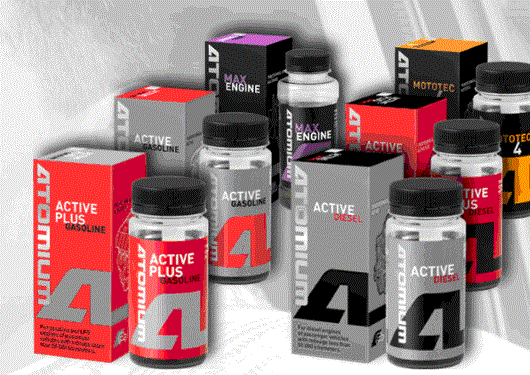
Atomium provide lubricants and motor oil additives, fuel additives, transmission oil additives, hydraulic liquid additives for cars and industrial equipment, designed for diesel, petrol and LPG engines, passenger cars, trucks and buses, motorbikes, and small technics.
The specific role of additives in motor oil are:
- Oxidation inhibitors. (antioxidants), Oxidation is the general attack of the weakest components of the base oil by oxygen in the air. It occurs at all temperatures all time but accelerates at higher temperatures due to presence of water, wear metals and other contaminants. under conditions of high temperatures in the engine, the motor oil can oxidize when reacting with oxygen. If that happens, the motor oil ages quickly, thickens and forms sludge. Antioxidants work to slow down this oxidation and the forming of deposits. They also help to keep the engine clean and prolong the life of the motor oil.
- Rust and corrosion inhibitors. These additives reduce or eliminate internal rust and corrosion by neutralizing acids and forming a chemical protective barrier to repel moisture from metal surfaces to protect lubricated surfaces against rusting and corrosion. The internal parts of the engine can rust and corrode because of exposure to moisture and acids. These additives create a film over the parts and protect them against damage from these hazards.
- Anti-wear agents and/ or extreme pressure (EP) agents. These additives are typically used to protect machine parts from wear and loss of metal during boundary lubrication conditions. They are polar additives that attach to frictional metal surfaces. They react chemically with the metal surfaces when metal conditions of mixed and boundary lubrication to protect parts of the engine that are susceptible to high temperatures such as cylinder walls, piston rings, lifters and cams. These additives form a protective layer on these components and prevent the friction that can occur because of metal-to-metal contact. They also act as antioxidants and are used up over time. They also help protect the base oil from oxidation and the metal from damage by corrosive acids
- Demulsifiers to promote oil-water separation.
- Viscosity Index (VI) Improvers are very large polymer additives that partially prevent the oil from thinning out (losing viscosity) as the temperature increases. The long-chain polymers help control the viscosity of multi-grade motor oils. They expand and contract as temperatures vary. High temperatures cause VI improvers to expand and reduce oil thinning; low temperatures cause VI improvers to contract and have little impact on oil viscosity. They are also responsible for better oil flow at low temperatures, resulting in reduction in wear and improved fuel economy.
- Pour-point depressants to lower the cold temperature fluidity of petroleum products. These additives work to prevent the hardening of wax particles in the motor oil under cold conditions. As a result, the motor oil flows freely even at low temperatures and does not need the engine to work harder to pump it. In this way, the engine continues to function effectively despite fluctuations in the outside temperature.
- Detergents and dispersants. Detergents perform two functions, they help
(clean) and neutralize acids that form in the oil. Detergents are primarily used in engine oils and are alkaline or basic in nature to keep hot metal components free of deposits and to maintain cleanliness of lubricated parts by taking care of the soot present in the lubricant. They are typically materials of calcium and magnesium chemistry. A detergent additive is normally used in conjunction with a dispersant additive. Dispersants are mainly found in engine oil with detergents to help keep engines clean and free of deposits. The combination of detergent/dispersant additives allows more acid compounds to be neutralized and more contaminant particles to stay suspended
- Anti-foam agents. The chemicals in this additive group possess low interfacial tension, which weakens the oil bubble wall and allows the foam bubbles to burst more readily. They have an indirect effect on oxidation by reducing the amount of oil air contact to reduce foaming tendencies. If the motor oil foams and forms bubbles, it is unable to coat all the important parts of the engine and keep it cool.
- Tackiness agents. These additives increase the adhesive properties of a lubricant, improve retention, and prevent dripping or spattering.
- Friction modifier. This additives alter coefficient of friction, and can be used to give oil more ‘slippery’ characteristics. In motor oils, friction modifiers are used to increase the oil’s lubricity for the purpose of reducing friction and improving fuel economy.



